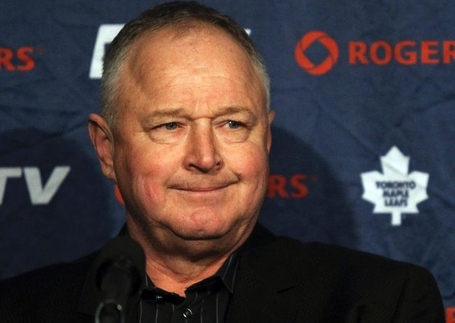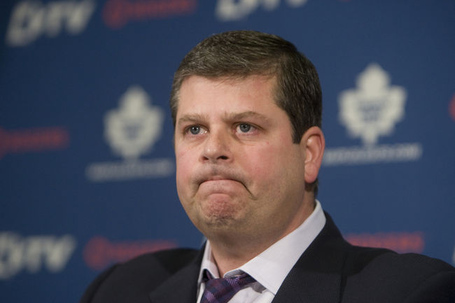(Credit goes to mf37 for the title)
On Thursday, a large contingent of the fanbase was made very happy (and another contingent of the fanbase was made quite livid) by news that Colton Orr was being rewarded for his, ahem, "contributions" to the Leafs making the playoffs for the first time since 2004 with a 2-year contract extension worth $925k per season. The 31-year old winger will be patrolling the fourth line and punching faces six minutes a night for two more seasons.
Naturally, opinions are very divided on this move. While I certainly appreciate Colton Orr's talents at disregarding the physical safety of other hockey players (by punching them repeatedly), the fact remains that by virtually every objective and subjective category, Colton Orr is an inadequate NHL calibre hockey player. Based solely on his hockey skills, there's not a single case to be made for Orr's continued placement in an NHL lineup. The case basically revolves around some sort of mysticism involving the role of a fighter and intangible qualities that make Colton Orr indispensable to the Leafs dressing room.
But this isn't about Colton Orr, because frankly Colton Orr matters little to the present and future of the Toronto Maple Leafs. He plays 6 minutes a night (poorly, I will add one last time), and makes very little against the salary cap. Pro-Orr supporters generally fall back to the point of "it's such a small contract. who cares?" We'll get to that later. But for now, let's examine the other ways in which this contract extension paints a very unflattering picture about the motivations and the thought process of the Toronto Maple Leafs management team.
Priorities
The other off-ice news in the NHL on Thursday was that the Pittsburgh Penguions announced that they have come to terms with superstar Evegeni Malkin on a very rich new deal. I say come to terms because acording to the CBA, the Penguins aren't actually allowed to announce an extension for another three weeks. Because you see, Evgeni Malkin's current contract runs until the end of the 2014 season, and the CBA does not permit teams from announcing a contract extension until one year before the expiration of their existing deal. The Penguins esentially announced they've agreed to the deal that Malkin will sign on July 5 when free agency opens.
What does Malkin's new contract have to do with Orr? Nothing. But Penguins GM Ray Shero knows who butters his bread, and has ensured that the Penguins continue to have a dominant core at centre with Sidney Crosby (signed to a long extension last year), and now Malkin. Even though the Penguins have a ton of unrestricted free agents this summer, including long-time forward Pascal Dupuis, and trade deadline mercenaries Jarome Iginla and Brenden Morrow, and a Norris Trophy candidate in Kris Letang also due for a new contract in 2014, Shero knows that his team will succeed or fail based on Crosby and Malkin, and ensured he retains both of them as long as possible.
Contrast that with Toronto. The Leafs captain, Dion Phaneuf, and their top scorer and overall best player, Phil Kessel, are both scheduled to be free agents in 2014, same as Malkin was. The Leafs goaltender, James Reimer, who dragged the Leafs within a minute of the second round of this year's playoffs, is a RFA that summer. Three of their top 9 forwards and 2 of their expected top 4 defence are free agents this summer. The Leafs are facing key personnel decisions that will shape how this club looks the next two seasons, and Nonis first move is to re-sign a fighter who plays six minutes a night.
That isn't to say that the Leafs won't take care of these players, but it's certainly frustrating to see a team that's been among the league's elite prioritize taking care of business with its superstar well in advance, and the Leafs now have a goon under contract longer than all but four of their players.
Alternatives
I didn't mention him with the other free agents, but Frazer McLaren, a mid-season waiver wire pickup, is also due for a new contract. As an RFA, the Leafs have the ability to re-sign McLaren should they choose with greater leverage.
While McLaren isn't much more of a true hockey player than Orr, he's younger, he's a better skater, he seems much more aware of what his hockey responsibilities are, and based both on his previous contract and his RFA status, will be significantly cheaper than Orr.
More importantly, the Leafs have a number of young forwards in their system (Joe Colborne, Carter Ashton, Jerry D'Amigo, and the veteran Ryan Hamilton) who deserve an opportunity to add more skill to the Leafs fourth line. With Orr re-signed, that takes away an opportunity for these guys to move up to the NHL level on a permanent basis. At what point does the Leafs insistence on carrying the likes of Colton Orr damage the teams' ability to produce good young (cheap) forwards to play in their bottom six? This year we saw it cost them a plethora of capable veteran players.
Consequences
This season, Matthew Lombardi was given away to the Phoenix Coyotes. Tim Connolly's career was effectively short-circuited by demoting him to the Marlies. David Steckel was given away to the Anaheim Ducks. Mike Brown was (hilariously) sold to the Edmonton Oilers. This summer, two young forwards in the Maple Leafs system have left for greener pastures. Greg Scott, an undrafted free agent who had excelled under Dallas Eakins, has left for Finland in search of a greater role. And Leo Komarov has agreed to head back to Russia after a one-year stint in North America.
Taken individually, none of these moves matter. Lombardi was dealt to make room on the NHL roster for Nazem Kadri. Connolly was demoted to grant cap flexibility. Steckel wasn't being utilized and Brown is a pretty bad hockey player in his own right. The losses of Scott and Komarov hurt but they are ultimately replaceable players. But Kadri never should have had to have room made for him like this, and the Leafs never took advantage of the cap room Connolly afforded them.
The point is that a full bottom six of NHL calibre forwards went out the door in a six-month period. All for little to no return. And all so that Colton Orr maintained a spot in the lineup for all but four games. It's an asset management disaster. Buying high and selling low is how the Leafs parted with two serviceable roster players in Alex Steen and Carlo Colaiacavo in exchange for Lee Stempniak, watched Steen evolve into an effective top six two-way forward, and eventually traded Stempniak for peanuts. The Leafs are on the verge of repeating old disasters because they refuse to make room for talented young players in need of their chance.
via storage.canoe.ca
Lineup Decisions
In Randy Carlyle's first partial season at the head of the Maple Leafs, he made curious lineup decisions. Faced with a team reeling from having thrown away a playoff spot and having just got their coach fired, Carlyle appeared to turn into the skid and roll the car, and the Leafs sank into the draft lottery, eventually settling at the 5th worst record in the league. Many wondered if Carlyle was simply taking the opportunity to discreetly tank.
Fast forward to this season and the odd lineup decisions only intensified. Players who had developed into reliable options under Ron Wilson (Jake Gardiner, Clarke MacArthur, David Steckel) were marginalized. Tyler Bozak was relied on almost exclusively as a de facto #1 centre, undercutting Mikhail Grabovski's enahanced role that saw him earn a new contract that now saw him scorned.
But most infuriating was Carlyle's insistence on a lineup that regularly featured two of twelve forward spots occupied by players who provided no real purpose other than to punch similarly unremarkable players, chase the puck around the defensive zone and throw reckless hits in large quantities.
On any given night, the Leafs were routinely working with three lines that they could count on to produce offence with regularity, one of whom Carlyle further burdened with intense defensive responsibilities. Carlyle even played directly into the hands of Bruins coach Claude Julien in Game 1 of the playoffs by continuing to dress both Orr and McLaren, providing a focal point for Julien to attack for offensive chances. Orr would play all seven games of the series, never playing more than 9 minutes.
As that series wore on, injuries forced Carlyle's hand into a more skill-based lineup. Gardiner and MacArthur returned to the lineup and made immediate impacts. The Leafs played much better and erased a 3-1 series deficit, and were on the verge of a momentous comeback before it all unravelled at the end of Game 7.
The hope was that Randy Carlyle would have learned, and made the necessary adjustments to optimize his lineup. Fool me twice... He didn't make the necessary adjustments this season after puzzling many with his lineup choices from the end of the 2012 season, and his approach was validated with a playoff berth on the back of a standout season from his goaltending. I wouldn't be holding my breath for a major sea change in Randy Carlyle's lineup.
via storage.canoe.ca
Inertia
The people defending this move have a curious outlook on pro hockey. They seem to think that players with the requisite confidence and will to succeed, who have been the best hockey players in their communities at all levels all the way up the development curve, are suddenly intimidated into not doing their job effectively by somebody like Colton Orr. Their view seems to believe that at no point in minor, or junior, or college, or minor-pro, or anywhere, did they come across somebody who tried to bully them off their game.
On the face it's an absurd argument, that doesn't even hold a shred of credibility, as evidence by Tampa Bay's Victor Hedman being so dmeonstrably afraid of Orr he continued to try and provoke the much smaller Nazem Kadri into a fight as Orr stood by. Or by small skilled forwards Brian Gionta and Rene Bourque not even blinking at entering an altercation with the much bigger Orr in the infamous scrum at the end of a one-sided Toronto/Montreal game. Or Patrick Kaleta consistently goading Orr into countless minor penalties that simply harmed his team and left him fully satisified with his job as all-world agitator complete.
Colton Orr fights other fighters, and puts his team in short-handed situations whenever he tries to interact with other smaller players. They laugh at him as he lumbers to the penalty box and their team goes on the power play. He's probably a wonderful human being and a great guy to have in the room, but he's a target for other teams to explout offensively every time he steps on the ice. So why was he re-signed?
As spectators, we shouldn't care about what perceived benefit Colton Orr brings to the room. Or anyone else for that matter. We don't have access to the room, so any sort of conclusions we attempt to draw are our own projections and attempts at amateur psychology. This is exacerbated by the spin put on what does come out of the room by Leaf employees and media who have a vested interest in protecting their ability to receive access. we can only judge on what we see. What we saw was a Leaf team with several holes and opportunities to get better, and Thursday they simply patched up one of those holes with an old standby. Orr's a guy who says and does a lot of right things, but ultimately there's a dozen guys under contract to the Leafs that could provide more value on the Lefas fourth line, who won't get that chance because Orr occupies one of 23 roster spots, and likely one of 12 forward lineup spots.
There's a very real sense that making the playoffs sets a dangerous precedent for the upcoming season. The risk is that the performance in the first round leads the Leafs management to believe that the team as currently constructed is good enough to contend for the Cup, so we need to bring back the guys that were key to that team.
The problem was it ignores the reality of the situation; the Leafs were a particularly bad possession team last season, and history isn't kind to teams with bad possession numbers that sneak into the playoffs in the following season. The Leafs played better with what was closest to their optimal lineup in the playoffs, but there's no real reason to believe Carlyle used it out of anything but necessity. And the Leafs relied on some particularly lucky breaks, that can't be counted on to happen again.
Resigning Colton Orr isn't necessarily a harbinger of doom; the fact that Orr was re-signed Thursday shouldn't preclude the Leafs from making any of the necessary changes. But you look at the actions over the psat six months by Leafs management, and you can't help but wonder "Why?" and "How?". Why would they work to re-sign Orr so quickly? Why would they bring back somebody so insignificant to the team's overall success? How do they expect to tangibly improve the team by continuting to hold on to players like Orr?
I can't adequately answer any of those questions. I only hope Dave Nonis can.




Comment Markdown
Inline Styles
Bold: **Text**
Italics: *Text*
Both: ***Text***
Strikethrough: ~~Text~~
Code: `Text` used as sarcasm font at PPP
Spoiler: !!Text!!